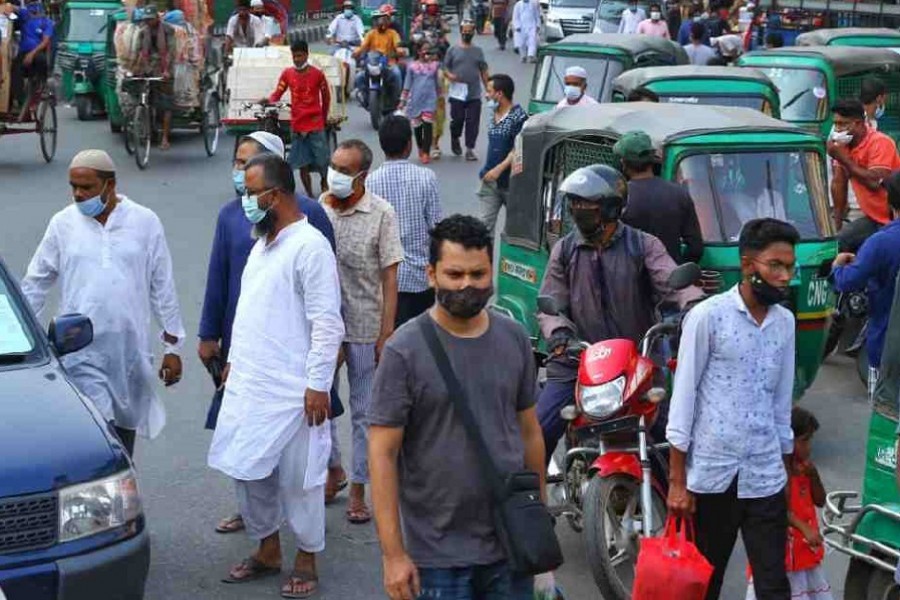
Published :
Updated :

Until the pandemic hit the world early last year, the word 'lockdown' was an almost unknown one. The word 'shutdown', however, is being used to define general strike.
The government has been imposing 'restrictions' of various types to rein in Covid-19 infections and fatalities intermittently. The media have described those as shutdowns or lockdowns. But the government itself had described the 14-day restrictions that came into effect at 6 am on July 23 as 'hard lockdown'.
Restrictions are primarily designed to curtail the movement of people and keep them confined to their respective homes. The titles used in the case of restrictions matter little. What is important here is the seriousness of the authorities concerned to enforce the same. No less important is the people's compliance level.
The restrictions imposed by the government before the ongoing one, in most cases, had been executed half-heartedly and those failed to deliver the desired results. Conflicting directives coming from various government agencies created confusion in the public mind. Hence, a vast majority took the Covid-related restrictions lightly and ignored those.
Bangladesh is not the lone country to impose restrictions on the movement of people, transports and business operations. Many countries have been doing the same to contain the deadly pathogen. But nowhere have the authorities showed such a lack of seriousness in enforcing the restrictions as has been observed here.
The ongoing lockdown, however, appeared different until last Saturday. Though some vehicles barring the permitted ones were plying the streets, qualitatively, the restrictions were working, to a large extent. The government seemed determined to observe the lockdown until the end. The home minister's rejection of businesspeople's plea to allow operations of mills and factories in public only amplified such a notion. He, possibly, could not comprehend what was coming. Only a couple of days after his public statement, the leaders of the country's major trade bodies held a meeting with the cabinet secretary and placed several demands, including the one related to the opening of the export-oriented industrial units with no further delay. Their opinion prevailed over the government's decision to observe a tough lockdown this time. The state minister for public administration on Friday last announced the resumption of operation of export-oriented industrial units from Sunday.
What happened following that announcement was terrible to watch. Tens of thousands of people, mostly garment workers and employees, came out of their village homes like locusts and crowded ferries, trucks, pickups, small motor vehicles or vessels to reach Dhaka. Many walked miles as no public transports were available. Vehicles charged exorbitantly taking advantage of the situation. None even thought about maintaining the physical distance, one of the three basic safeguards against Covid infection.
It is truly difficult to understand the strategy the authorities have been pursuing since the virus surfaced in March 2020. The government had suddenly lifted restrictions on the eve of the last Eid-ul-Adha to allow people to go to their homes and open shops and market between July 15 and July 19. This was not the time to do so as the infections and fatalities had reached new highs after a brief lull. The situation continues to be tough until now as far as the pathogen's behaviour is concerned.
The ongoing lockdown with all its weaknesses has produced some positive outcomes. The infection that had shot up to 30 per cent a couple of weeks back is still hovering around that mark. Without the current restrictions, it had all the potentials to reach 40 to 50 per cent or more, as had happened in neighbouring India in the months of May and June this year. But the latest abrupt decision to open a section of mills and factories might negate the gains.
Restrictions on free movement and economic activities in any form are not acceptable to most people. This is true with democratic societies. A country like Bangladesh has some specific compulsions. It cannot keep its export-oriented industries shut for a long time. Its poor and low-income people will starve if they cannot earn their meagre daily wage. The government also does not have enough resources to feed all of them even for a few weeks.
The debate---which comes first, life or livelihood---has been going on for sometime. Medical experts prefer to save a life. When the government policymakers sit with the medical experts they promise to go by the latter's advice. But they succumb to pressure exerted by various interest groups including businesses and soften their tough stance on dealing with the virus.
Such vacillation by the government has been sending a confusing message. There is a propensity to blame the people for the Covid-related infections and fatalities reaching such a high level. But the government's actions or lack of the same concerning Covid treatment facilities and controlling infections are no less responsible.
Businesses and factory owners, naturally, would demand reopening of their establishments since restrictions hurt them financially. The economy, too, suffers enormous loss. But the government would have to weigh the loss and gain, in terms of lives saved because of the restrictions.
The authorities should listen to the experts who understand science and prepare their advice accordingly. The policymakers must stop showing their muddled state of mind in matters of tackling the pandemic.


 For all latest news, follow The Financial Express Google News channel.
For all latest news, follow The Financial Express Google News channel.